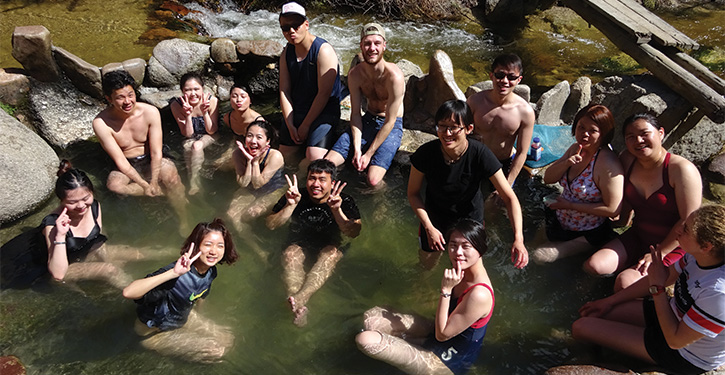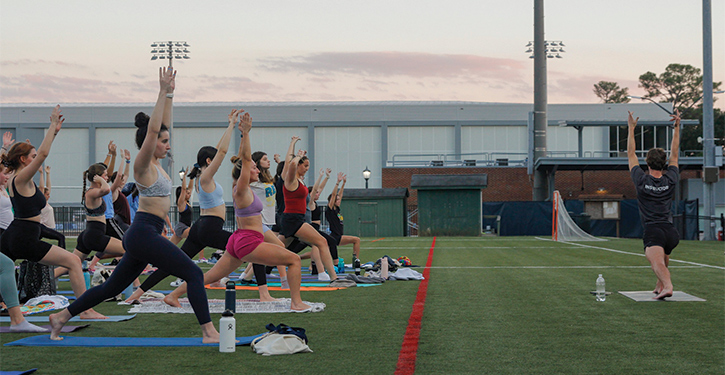Boise, Idaho, is surrounded by lakes, rivers, trail systems and ski resorts. In fact, the Boise River flows through the middle of the city. All these features have made the area an outdoor recreation epicenter for the public. With many of these environments being within a 15-mile radius of Boise State University (BSU), the Campus Recreation department is providing students with several passive recreation opportunities to escape into nature.
Such offerings include:
- Floating down rivers in kayaks or rafts.
- Hiking.
- Biking.
- And more.
Jordan Frank, the assistant director of Outdoor Programs, said having such offerings for the student body is a great recruitment and retention strategy, and builds bonds on campus.
“We hope we are a chance for students to connect and meet others as well as a source of information and knowledge,” said Frank. “We are a community center first and a recreation program second, and we take ownership of a strong community, connection and sense of belonging provided to students through outdoor recreation opportunities.”
Since the start of the COVID-19 pandemic, passive recreation is trending up. More people are looking to get away from the stresses of their daily lives through peaceful activities, commonly through spending time in nature.
This interest in leisure-based activities is also prevalent at the University of North Carolina at Chapel Hill (UNC-Chapel Hill). Jason Halsey, the director of Campus Recreation, said the department’s 67-acre Outdoor Education Center (OEC) is home to Carolina Adventures Expeditions and a mixture of passive recreation events.
EXTRA CREDIT: LSU University Recreation’s eye-catching arcade area attracts more of its student body.
“It includes an 18-hole professional-level disc golf course featuring a mix of open and wooded holes through the rolling piedmont hills and almost four miles of recently completed multi-use trails open for hiking, running and mountain biking,” said Halsey.
In addition, the OEC has:
- Three sand volleyball courts.
- Eight tennis courts.
- A bouldering wall.
- A comprehensive high and low elements challenge course for scheduled group programming.
Halsey said usage of the OEC exploded during the pandemic as students and the local community took advantage of the opportunities and sought new ways to stay active.
In addition, UNC-Chapel Hill’s aquatics program has passive activities like annual Battleship tournaments or the back-to-school dive-in movie at Kessing Outdoor Pool. Both events attract hundreds of students each year.
“One of the most popular special events on campus is our monthly Rec After Dark Block Party,” said Halsey. “These events are held once per month on a Friday evening from 8 to 11 p.m. as a substance-free late-night program. The showcase includes free climbing, crate stacking, slacklining and indoor adaptations of our Flying Squirrel High Ropes Course activity. Average attendance for these late-night events is around 250 students.”
For those seeking peaceful activities, Halsey said students really enjoyed their outdoor fitness classes that include yoga and Zen Zumba. These classes are usually hosted on University Wellbeing Days. They were incorporated into UNC-Chapel Hill’s academic calendar to support the mental health of students.
EXTRA CREDIT: At Binghamton University, forest bathing is one option for leisure and passive recreation.
“We are exploring ways to highlight more passive recreation opportunities that students can take advantage of during Wellbeing Days and other stress-inducing periods of the semester,” said Halsey. “
Halsey shared these include:
- Mindfulness hikes.
- Stargazing and s’mores.
- Challenge course activities.
- Firepits.
- Paddleboard trips.
- Rotating drop-in activities.
Providing these activities in nature is a large focus for the department. Russell Hobart, the assistant director of Climbing Programs, said the benefits of being outdoors are a perfect reflection of the needs of college students.
“It reduces stress and insomnia,” said Hobart. “It improves attention and mood. At Carolina Adventures, we work to amplify these benefits through creating an intentional experience that helps students build community and get to know themselves.”
To enhance the outdoor offerings, Halsey said they collaborated with Trail Science, a donation-based trail building company whose members hand built all of UNC-Chapel Hill’s multi-use trails over a three-year period for free. He said volunteers from across the student and Chapel Hill community contributed to the project. In fact, the partnership broadened and strengthened the local mountain bike community.
Nature trails are also heavily utilized at Slippery Rock University (SRU) where Andrew Loue, the assistant director of Adventure, said they have a wooded path system for walking, running, hiking and mountain biking.
“Each program introduces our students to the green spaces that are available to them and, in turn, gives them the confidence to independently use the green spaces,” said Loue. “Our goal is not to fill programs but rather encourage independence and exploration. We serve students from both urban and rural environments and there is something magical about introducing students to open spaces when it’s not part of their comfort zone.”
EXTRA CREDIT: Creative campus collaborations that create unique programming opportunities for students.
Loue said one initiative his department is very excited about is a potential partnership with the university’s Counseling Center to offer walking meditation programs.
“Outdoor activities allow participants to live in the moment and be present,” said Loue. “As we all become more connected to our phones, being present is a unique and important experience. If green space is available on campus, use it. Otherwise, find a local park. Simple programs like establishing hammock and slackline zones on campus are often popular.”
Like at SRU, BSU Campus Recreation takes advantage of its surroundings by hosting trips to the dozens of hot springs located in Idaho as well as to rivers so students can relax while floating.
Frank said they use Northwest River Supplies for any water-related necessities and raft company AIRE for float tubes.
“We have a few trips a semester out to hot springs for relaxing soak time,” said Frank. “Folks love to soak and take in the scenery in a natural hot spring. Floating is a common favorite among students in the summer months. It has a low entry with gear, it’s passive, fun, group-focused and inexpensive.”
By following the example set by BSU, SRU and UNC-Chapel Hill, any campus rec department can use the available resources and outdoor areas to transform campus into a peaceful getaway for students through passive recreation.











